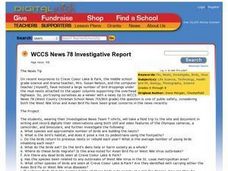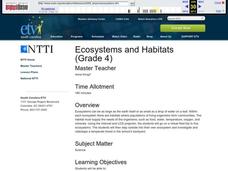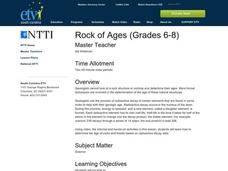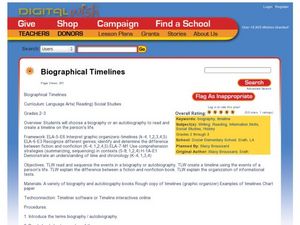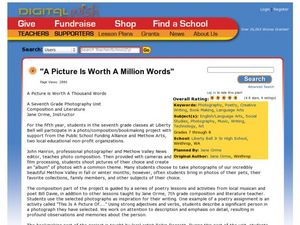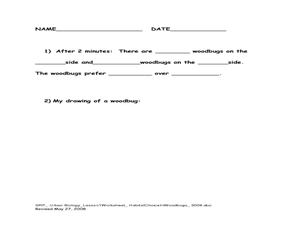Curated OER
The Differences Among Us
Students compare cultures. In this writing skills activity, students collaborate to chart the tradition and cultural beliefs of their classmates. Students use their finding to write comparative essays regarding the similarities and...
Curated OER
Earth Matters
Students identify Earth's equator, prime meridian, lines of latitude, lines of longitude, parallels, and meridians.
Curated OER
Ant City
Students develop an ant colony that adults and children can visit. Students create different areas including places where tourists can view live ants, play ant games, research facts about ants, and create ant art. Students serve as...
Curated OER
Inequalities
Seventh graders graph solutions for inequalities on a number line. They solve 1 and 2 step inequalities in one variable. Students also check solutions to 1 and 2 step equations in one variable
Curated OER
Cultural Celebrations
Students create a presentation for their assigned country. In this cultural diversity lesson plan, students use a WebQuest to research a country. In groups, they decide upon a way to present the information they have learned. Students...
Curated OER
Inequalities lesson 4
Seventh graders graph solutions for inequalities on a number line. They solve problems combining like terms inequalities in one variable. Students check solutions to combining like terms inequalities in one variable.
Curated OER
Graphing Favorite Holidays
Students create spreadsheets and bar graphs based on results of survey of favorite holidays.
Curated OER
WCCS News 78 Investigative Report
Young scholars role play the role of investigative reporters. In groups, they determine what type of bird is leaving its droppings on the overhead highway beams. They answer a given set of questions and present their conclusions to the...
Curated OER
The Turkey Web
Students identify habitat and feeding habits of the wild turkey. In habitat and diet lesson students view a demonstration, complete an activity then follow turkey sign.
Curated OER
Photojournalism: Documenting the Four Greatest Threats to Global Sustainability
High schoolers study global sustainability by viewing photos. In this environment lesson students work in groups and create their own photo gallery.
Curated OER
Ecosystems and Habitats
Fourth graders go on a virtual field trip to five ecosystems. They investigate and videotape a temperate forest in the school's backyard.
Curated OER
Rock of Ages
Middle schoolers use a video, the Internet and hands-on activities to explore how to determine the age of rocks and fossils based on radioactive decay data.
Curated OER
Centipede or Millipede?
Learners discuss millipedes and centipedes in terms of their classification as arthropod. Using a diagram, students categorize and compare and contrast the characteristics of millipedes and centipedes based on their discussion of...
Curated OER
Insects
In this insects learning exercise, students read a short passage on insects and then answer 4 short answer questions on the lines provided.
Curated OER
It's All in the Rings
Students examine how the environment influences tree growth. In this tree lesson, students analyze the growth of rings to see how plants adjust to adverse conditions in order to survive.
Curated OER
Biographical Time lines
Students create a time line. In this biography instructional activity, students define biography and autobiography and then read short examples of each. Students create a time line using a read aloud.
Curated OER
A Picture is Worth a Million Words
Students practice composing digital photographs by documenting activities in their lives. In this photography instructional activity, students utilize digital cameras to create beautiful art from things they find around the campus...
Curated OER
"SMART" Science
Seventh graders explore science topics using a SMART board. In this respiration instructional activity, 7th graders see how and why cells use cellular respiration. They see a cellular respiration recipe on the SMART board and watch as...
Curated OER
Wild Flower Project
Students photograph as many different kinds of wild flowers that they see around their school. In this wild flower lesson plan, students take different pictures of wild flowers after identifying their characteristics and coming up with a...
Curated OER
Habitat Choice in Woodbugs
Students investigate woodbugs. For this scientific investigation lesson, students explore the steps scientists take when conducting an investigation using live specimens. Students explore habitat preferences for woodbugs in various...
Curated OER
Classify Forces
Third graders compare and contrast the forces of pushing and pulling. As a class, they take a field trip around the school and write down any action they see and any object that is motionless. In groups, they use magazines to cut out...
Curated OER
Creative Play with Number Rhymes
Students practice the skills of jumping and landing while emphasizing a balanced position on a low balance beam.
Curated OER
Cruise Conditions Graphing & Statistics
Students monitor weather conditions for an eighteen day period at a specific location. The temperature of both air and water is taken and the mean, median, and mode calculated. Differences between the highest and lowest recordings are made.









